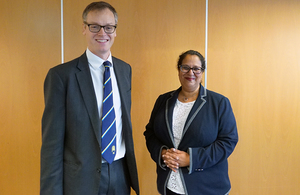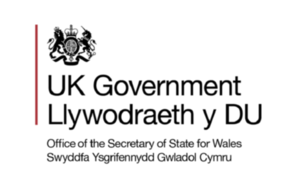Solicitor General meets government lawyers in Bristol
News story
The Solicitor thanked them for their vital contributions.

Solicitor General Michael Tomlinson visited the GLD hub in Bristol on Monday to meet lawyers working on some of government’s most important legal work. The Solicitor was joined by Mel Nebhrajani CB, Director General of GLD’s Employment with Economic Recovery and UK Governance directorate who is a champion for the office at GLD.
Government lawyers work on some of the most high-profile and demanding legal issues of the day. Their work touches on all aspects of everyday life from transport to education. GLD is committed to providing opportunities across the UK as more jobs are now being moved outside of Westminster.
The Solicitor thanked Bristol colleagues for their hard work supporting the government’s legislative agenda and for helping the government to govern well, within the rule of law. As a former barrister on the Western Circuit, he stressed that the vital work taking place in Bristol demonstrates that you don’t need to be based in London to have a fulfilling and demanding career in the Civil Service.
Reflecting on the visit, Solicitor General Michael Tomlinson said:
I was thrilled to meet so many of the dedicated government lawyers in Bristol today and to be able to thank them for their work which ensures the government can deliver for UK citizens.
As a barrister who practiced on the western circuit for years before becoming an MP, I know first-hand the incredible work and dedication of lawyers who work outside of London.
The growth of GLD’s presence in Bristol is testament to the fact you no longer need to be based in London to have a demanding and fulfilling career in the Civil Service.
Quote from Mel Nebhrajani CB, Director General, Employment with Economic Recovery and UK Governance Directorate:
I was delighted to welcome the Solicitor General on his visit to the Government Legal Department in Bristol. The Solicitor’s enthusiasm for colleagues, our work and our growth in Bristol is deeply appreciated and it was so inspiring to connect with our dedicated and talented Bristol-based colleagues.
They work seamlessly with GLD colleagues and clients all across the country on fascinating and diverse work. With the growth of Bristol and Leeds, in addition to London, there has never been a more exciting time to be working in the Government Legal Department.
Quote from Robert Wardell, Deputy Director based in Bristol
It’s a really exciting time to be at GLD in Bristol. We have so many new and established colleagues here in three busy and growing offices, doing a very diverse range of vital GLD work. It’s also great to have visitors and really pleasing for the teams based here to meet the Solicitor General in person.
Published 25 November 2022
